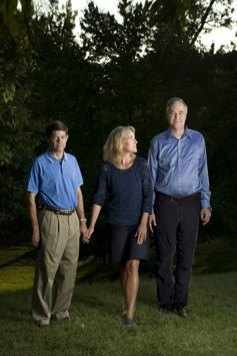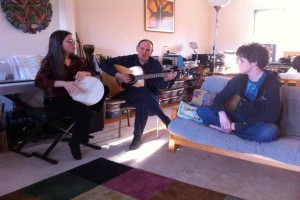 Never is the word "polyamory" mentioned, but this extremely touching article from The Washington Post chronicles a unique situation that has echoes of non-monogamy. Page and Robert Melton had been married for eight years when, in 2003, Robert suffered from a heart attack and collapse that left him with a serious brain injury. Robert, who had previously worked as an editor and reporter for The Washington Post, suffered from profound cognitive loss.
Never is the word "polyamory" mentioned, but this extremely touching article from The Washington Post chronicles a unique situation that has echoes of non-monogamy. Page and Robert Melton had been married for eight years when, in 2003, Robert suffered from a heart attack and collapse that left him with a serious brain injury. Robert, who had previously worked as an editor and reporter for The Washington Post, suffered from profound cognitive loss.
Robert eventually came to understand who his family was, but he was moved into an assisted living facility. In the years that followed, Page busied herself with her full-time job as a government-affairs consultant and her work as an advocate for brain-injury and caregiver groups. Page had never considered entering a new relationship, but that changed in 2008 when she reconnected with an old classmate, Allan D. Ivie IV. From the start, this was not a traditional relationship.
[Allan] realized that the only way their relationship could develop was if it included Robert. As he started falling in love with Page, he said to her: "I see this responsibility that you have, and I want to help you with it. I understand this is a package deal."
"That's what triggered the relationship," Page says. "He understood that Robert was central to our lives, that we needed to take care of him."
Allan proposed to Page in June of 2010. When Page nervously brought the news to Robert, he replied, "You should marry him. He's a good guy." Allan and Page decided that they would move the family to Allan's home city of St. Louis -- and Robert would come with them.
Page formally divorced Robert while remaining his legal guardian. Then she married Allan in a heartfelt ceremony:
As Allan held Page's hands, he promised to always love her and her daughters. He turned to Hope and Nell, who were their mom's attendants, and smiled. Then he looked back at Page: "And I promise to always help you provide compassionate care for Robert."
Today, Robert is settled into an assisted living facility in St. Louis, where Page visits him several times a week. Allan writes him daily emails and takes him to breakfast every Wednesday.
"In a way, I feel married to Robert forever," [Page] said . . . "It's not a traditional marriage. It's not the marriage we signed up for. But I feel like there's a connection there that never ends."
. . . Robert has grasped the essence of their relationship better than any of them. He understands, she says, "that it's not the legal arrangement, it's the emotional arrangement, that emotional commitment."
Read the full story on The Washington Post.


 Never is the word "polyamory" mentioned, but
Never is the word "polyamory" mentioned, but